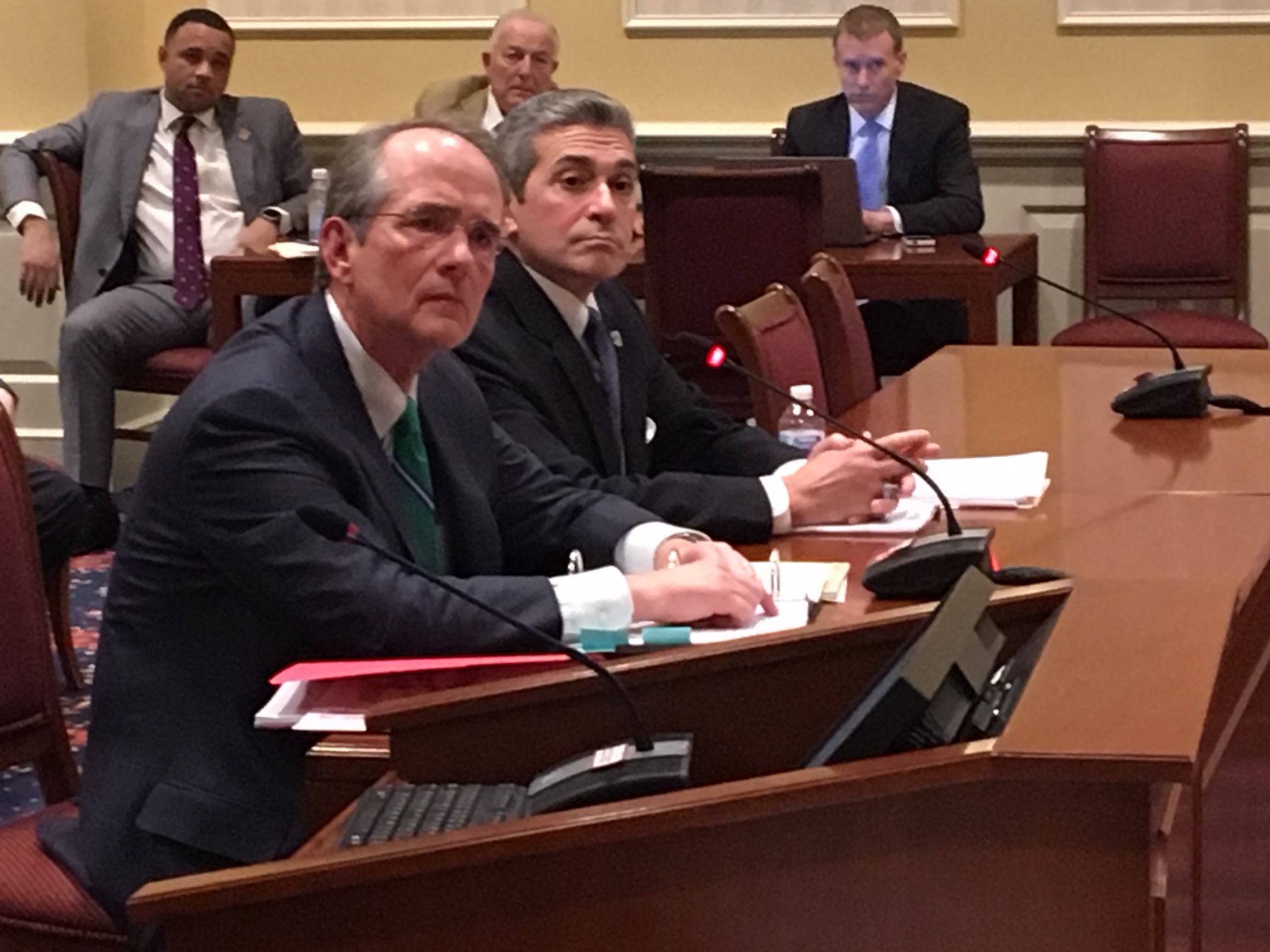Origin and Merits of Liquor Regulation Bill Lost Amid Personal Animus

The Senate panel that will decide the fate of a high-profile alcohol regulation bill appeared, at times, to be bystanders to a personality clash between the measure’s sponsor and the state’s tax collector. With Friday’s testimony generating as much heat as light, it was difficult to determine whether the legislation is likely to win the votes it will need to advance.
Ostensibly, the leadoff witnesses, Sen. Benjamin F. Kramer (D-Montgomery) and D. Bruce Poole, a former state delegate who chaired a task force on the health issues associated with alcohol, were there to advocate on behalf of the commission’s more than two dozen recommendations.
Poole stuck mostly to the business at hand, describing for the Senate Education, Health and Environmental Affairs Committee some of the ways Maryland could replicate approaches used by other states to reduce binge drinking and driving under the influence, and to educate the public about addiction and the high alcohol content in some beverages.
“The problem of addiction in our society is staggering and it is getting worse,” he said, adding that local health departments don’t have the resources needed to combat the problems.
Kramer, on the other hand, took a different tack, offering a lengthy and at times personal rebuttal to criticisms lodged by Comptroller Peter V.R. Franchot (D) and his PR-savvy team.
The measure’s most controversial component would shift field enforcement of alcohol, tobacco and gasoline from the comptroller’s office to a new five-member commission appointed by the governor.
Franchot and his top aides have launched a full-court press to block this piece of the bill, arguing that Maryland has an effective, seasoned field enforcement unit that should remain in the tax collector’s office.
The first witness to testify on the bill, Kramer sought to refute what he called “the relentless… drumbeat of lies and misinformation.” This went on for some time.
Cleary exasperated, EHE Chairman Paul G. Pinsky (D-Prince George’s) admonished Kramer, a fellow Democrat, to stick to the substance of the bill.
As Kramer accused Franchot of over-aggressively soliciting campaign contributions from the industry he regulates, and utilizing “Bernie Madoff-like aplomb” to “manipulate segments of the industry … ,” Pinsky could hold his tongue no longer.
“Senator, Senator, let’s focus on the bill, what the bill does and what it doesn’t do,” Pinsky said. “If someone has different views of the bill, we can talk about those views.”
“But let’s try to be a little focused on the legislation.”
“I appreciate that very much, Mr. Chair,” Kramer said with apparently sincerity.
He then, however, immediately launched a charge that Franchot routinely “extorts” campaign contributions from liquor interests, an allegation the comptroller swiftly rejected.
On Sunday, Franchot released a video poking fun at how often Kramer referred to him at Friday’s hearing.
Although the measure would appear to give more power to Gov. Lawrence J. Hogan Jr. (R), who would have the ability to appoint all five members of the proposed Alcohol, Tobacco and Motor Fuel Commission, Republicans on the panel expressed concerns about the bill.
Sen. Mary Beth Carozza (R-Lower Shore) expressed disappointment that the task force didn’t have the state Department of Budget and Management consult on the proposed shift in oversight.
Sen. Bryan W. Simonaire (R-Anne Arundel) called it “naïve … to say there aren’t politics involved here,” an apparent reference to Franchot’s ongoing feud with General Assembly leaders.
Sen. Jack Bailey (R-Calvert, St. Mary’s) wanted reassurance that field enforcement officers (who Kramer said would answer “the same phones at the same desks in the same office” as they do now) would not lose promotional opportunities or workplace benefits.
In an interview, Sen. Arthur Ellis (D-Charles) said the link between the health impacts of heavy drinking and the commission’s recommendations appeared to be thin.
“They brought up issues that are very important,” he said. “But the way they’re describing fixing it doesn’t really get at those issues.”
David Brinkley, OBM secretary, told the committee that the bill would cost taxpayers far more than the Department of Legislative Services has estimated. He said that a similar proposal in 2003 carried a fiscal note of more than $18 million for new offices, personnel and equipment, more than double what DLS has estimated.
“The proposed action is managerially shortsighted, fiscally imprudent and operationally unsound,” Brinkley said.
A lawmaker who wished not to be identified said Kramer’s decision to trash Franchot at length represented a missed opportunity to highlight the bill’s merits. While it may not have doomed the bill to defeat, the legislator said, it certainly didn’t help.




 Creative Commons Attribution
Creative Commons Attribution